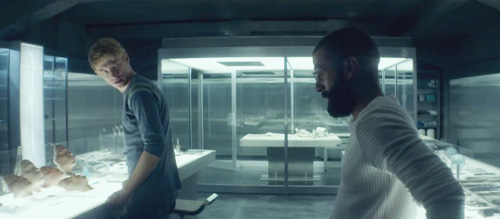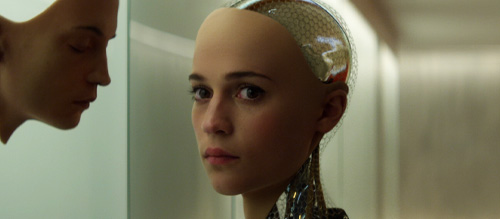Ex Machina (2014) Review
This article was originally published to SSP Thinks Film by Sam Sewell-Peterson.
Ex Machina (2014)
Director: Alex Garland
Screenwriter: Alex Garland
Starring: Alicia Vikander, Domhnall Gleeson, Oscar Isaac, Sonoya Mizuno
We had waited such a long time for a film to truly deliver on the promise of an AI thriller. 2001: A Space Odyssey’s most memorable passage is an astronaut trying to reason with the murderous computer HAL, but that’s only about one third of Kubrick’s epic sci-fi. The Terminator and Matrix franchises are action vehicles first and foremost, and we’ve also seen such disappointing offerings as I, Robot, which soon dispensed with anything cerebral in favour of Will Smith star power, Chappie which was underdeveloped to the point of being incoherent, and Marvel’s Avengers: Age of Ultron which was spectacular but muddled and overstuffed. After proving himself as an accomplished screenwriter for Danny Boyle (writing 28 Days Later and Sunshine), Ex Machina saw Alex Garland finally try his hand at directing. What a debut it proved to be.
When Caleb (Domhnall Gleeson) unexpectedly wins a competition to meet the reclusive founder of the technology company he works for, little can he guess what his trip to Scandinavia has in store for him. Over the course of a week, Nathan (Oscar Isaac) uses his star-struck employee as a guinea pig for a unique experiment. Caleb’s mission is to conduct a series of Turing tests on Nathan’s artificial intelligence, Ava (Alicia Vikander), to find out whether or not she can fool others into thinking she is human. As the trio test each other, it becomes increasingly clear that everyone has their own agenda, and nothing is as it seems.
As well as fielding all the usual discussions that come with the concept of artificial intelligence – free will, what it means to be human, etc. – Ex Machina also explores the twin themes of observation and control. From the very first shot Caleb is being observed; he is observed from the moment he meets Nathan and especially when he comes into contact with Ava and she starts to process his “micro-expressions”. Likewise, Caleb observes Nathan and Ava constantly, always trying to figure out what their endgame is. All three of our central characters are battling for control, manipulating each other to gain the upper hand. This is a plot that is a constantly shifting chess game of a character piece.
For the most part we follow just three characters as they observe each other, and we notice both major and minuscule changes in their behaviour as the situation shifts. The scale of the task facing three actors under such close scrutiny was not a small one, but Domhnall Gleeson, Alicia Vikander and Oscar Isaac are well up to the challenge. Gleeson and Isaac are both extremely good fits for their characters, playing them as good-natured everyman and charming, subtly creepy schemer respectively, but it is Vikander who makes the biggest impression as Ava. We’ve seen a lot of humanoid robots in movies, and a good number of them have appeared to be almost human – Vikander could have gone the full Robocop with stiff, controlled physicality, but she cannily chooses to instead make Ava naturalistic in all but a few of her movements. You can forget Ava is an artificial being until a slightly odd change in expression or movement doesn’t quite fit the rhythm that a real person gives off. It’s subtle, sometimes even barely noticeable, and all the more uncanny for it.

Ex Machina has an eerie, uncomfortable atmosphere throughout, but this is balanced with moments of extreme beauty, unexpected humour and shocking horror. Here, Garland has proven himself a talented director with a clear vision right out of the gate, but he is first and foremost a screenwriter, and the script of Ex Machina represents his finest achievement. The screenplay is layered and intelligent without being overwhelmingly science-y, preferring to always to shift focus to how its three core characters behave in each other’s company or how they perceive their place in the rich tapestry of life. The film’s dialogue is economical and snappy, summing up its complex ideas succinctly in profound, brief statements rather than dreary monologues (“If I hid Ava from you so you could just hear her voice, she would pass for human. The real test is to show you that she’s a robot and then see if you still feel she has consciousness.”). Garland also indulges his love of left-of-field plot turns and steadily piling up the tension for a thrilling horror-tinged finale.
Garland’s work is aesthetically distinct and memorable, but is not concerned with fireworks. Ava’s introduction is one of those moments on film that will stay with you. It’s not showy, in fact it’s rather understated. In wide shot, against a wide window, she walks slowly into view in profile, her robotic innards revealed by the light shining through her. The plot quickly finds a contrivance for Ava to conceal her inner workings and in doing so save the film’s modest budget, but it makes sense with her character and also makes the occasions when we do see her artificiality laid bare all the more startling.
You could dig far deeper into the themes, character motivations and plot of Ex Machina, but it’s the kind of film where you really don’t want to know any more than you have to before you experience it for the first time. It’s a sci-fi you want to go into cold to get the very most out of it. See it now if you haven’t already, and if you’ve already seen it, then see it again and debate it with others. This film can only become richer and more enthralling upon multiple viewings and through intense debate.
23/24
Recommended for you: Alex Garland Directed Films Ranked


